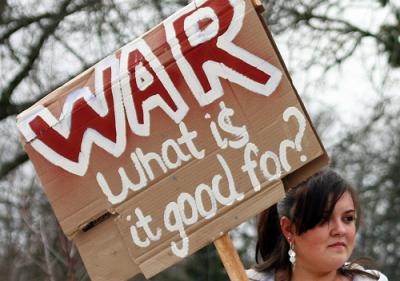What is war good for? An opinion concerning an unending human drama

The photo was taken during an anti-war demonstration and published March 20,2008 in the Bellingham Herald. The question certainly demands an answer. How many presidents, generals, religious persons and working men and women around the world take time to pose and attempt an answer? At question is the war the Bush Administration organized to invade oil rich Iraq.
If we forget about war for a minute--the economic, political, nationalistic or geopolitical foundations it is based on--we might find in individual human beings the seed for conflict. If A shouts at B, saying he did or did not do this or that, and if B shouts back as loud or louder, there are several possibilities. The first is obvious: both A and B will shout louder and louder, insult each other more and more, say things they really don’t mean, and eventually end up in a fist fight...or something worse. Another possibility: B pays no attention to A’s wrath. That in turn may produce two possibilities: enfuriated, A increases his aggression and provokes B into responding. If B does not respond, he may be attacked. In that case he may either fight back in self defense or allow himself to be mistreated. Another possibility--there are many--is that both A and B--after lambasting each other verbally--realize that it is more reasonable to negotiate their differences.
Now, let’s get back to the question at hand. Oil no doubt is part to blame in this case. The United States faces an acute energy crisis due to the top-heavy reliance of its industrial system on petroleum based fuels. Geopolitics? Especially since the end of World War II, the idea that as a "big power" Washington should resist any advance of its ever changing enemies has gained ground. As a result of that reasoning, certain countries were brought into the tug-of-war between Washington and Moscow; others were considered geopolitical strongholds--Pakistan, Greece, Israel...Then you had the idea of "the balance of terror" under the theory that war could be avoided by developing the biggest and worst atomic weapons. More recently: the notion of "preventive warfare," a sort of remake of the theory that there are "justified" wars.
The wars of territorial conquest--as those during the Roman Empire, the U.S. wars against Mexico and the Spanish colonial system, the Soviet invasion of eastern Europe--seem to have gradually become outmoded. Wars such as those in Correa and Vietnam were more geopolitical than wars for territorial expansion. However, the invasion of Iraq, on the wake of unprecedented lies and threats, (an example of 'preventive warfare') adds ample confusion in view of the fact that the 'war against terrorism' in theory is directed against individual organizations rather than nations, whereas in practice the war is directed against Iraq and Afghanistan and is mixed in with the cold-war age notion about setting up local U.S. friendly goverments.
Back to the question: has the present 'anti-terrorist' war or any other war really achieved anything good? There are of course those historians who argue that the Roman conquests, and the colonial power grabs, as well as these more modern wars, can be justified in view of the "benefits" they bring to the subjected peoples: the roads and infra-structure left behind by the Romans, the "Christianization" of Latin America, the democratization of post World War II Europe...in fact, however, most of the benefits have been for the 'winners.' History always seems to side with the winners. Finally, there are those in Washington who have found and even more curious argument to justify U.S. wars: first destroy, then rebuild.
The present "anti-terrorist" war, announced by the Bush Administration following the attack against the Twin Towers in New York, is unique for a number of reasons: it is in theory not against another nation but against an association of individuals described as "terrorists." The definition has never been made very clear and often has served to smear other organizations whose goals are more political and social. Likewise, it raises a difficult to answer question concerning when "victory" can be proclaimed. Finally, tactics such as abuse of prisoners have been justified on the official level, something that is in clear contradiction with international conventions on war and the treatment of prisoners.
The question remains, however, and still must be asked again and again: What is war good for? And are there not other ways of solving conflicts?
0 comentarios